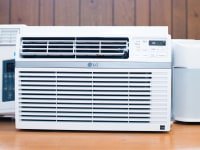Products are chosen independently by our editors. Purchases made through our links may earn us a commission.
For many, summer means a sweat-inducing environment and oilier skin. And if you have a dry skin type, you may relish this because it means no more tight, parched skin. But ironically, higher temps aren’t always a reprieve even in the most humid of climates, if you spend your days going in and out of air conditioning.
We spoke with Dr. Cybele Fishman, a board-certified dermatologist with Advanced Dermatology PC in New York, to learn how you can get your icy relief and keep your skin happy.
How does air conditioning affect your skin?
The purpose of air conditioning is to mitigate a warm and/or sticky environment, but in the process, it decreases moisture that your skin needs. As air blows over your air conditioner’s interior coils, moisture will either evaporate or condense and turn into water that drips from the unit. A typical home has an ambient humidity level of more than 30%, so if your A/C unit dips below that, the air will pull moisture from the surface of your skin, leading to dehydration, itchiness, and tightness.
How can you combat dryness from air conditioning?
The key to preventing or combatting your skin’s dryness is to add moisture back into the air. The easiest way to do this is by turning off your A/C when you don’t need it (like when you’re not home) to let some humidity creep back in. If you live in a very dry climate, you can also add a humidifier into the picture to cancel out the reduction in humidity while keeping your air conditioning on to lower the temperature.
After testing humidifiers, we at Reviewed recommend the Levoit Classic 300S, as it’s easy to use, holds about two gallons of water, sounds quiet, and can run for 16 hours at full steam to provide plenty of humidity.
Moving away from your environment, you can combat dryness by giving your skin some T.L.C. “Moisturize often, especially hands which get washed and disinfected a lot,” Fishman says. “ Look for a moisturizer with humectants like glycerin or hyaluronic acid, and emollients/occlusives like shea butter or oils.” A face moisturizer that fills the bill is Reviewed’s top pick First Aid Beauty Ultra Repair Cream, which contains colloidal oatmeal and allantoin to soothe the skin, glycerin to hydrate, and shea butter to moisturize.
For a body lotion, we recommend the Lubriderm Daily Moisture Lotion for its creamy texture and hydrating ingredients, such as glycerin and panthenol.
For an extra boost of hydration on the go, Fishman also recommends a hydrating mist, such as the Herbivore Botanicals Rose Hibiscus Face Mist that contains hyaluronic acid, rose hydrosol, and coconut water to hydrate the skin.
Of course, you should also drink plenty of water to keep your skin happy, Fishman says: “Stay hydrated by drinking water. If your insides are dry, your skin will be dry!”
Illustration by Stephanie DeAngelis for Reviewed.


